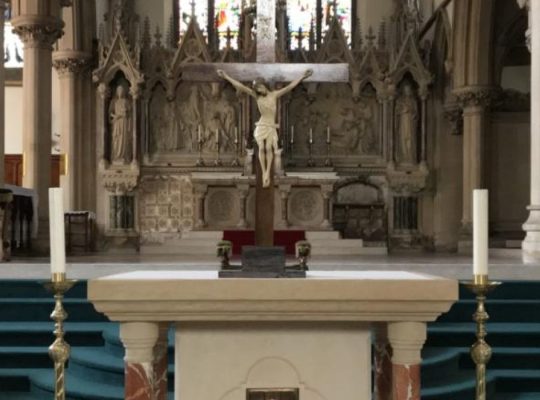Continuing on the road to Jerusalem with Jesus, we see, even after long and careful reading and re-reading, the demands of the Gospel and discipleship can surprise or even shock us. They sometimes seem contrary to established human wisdom! They promote attitudes and ways of acting so opposite to our most common behaviour! Shouldn’t they be modified, nuanced in such a way to be acceptable? Or is it, as I suspect, us that has to change, in order to conform to what God wants of us? Isn’t this what Jesus is teaching us whilst on the road — to be ready for the mission ahead — to be good disciples —and ultimately to share in the great banquet of heaven?
It is in every sphere of action that these demands of the Gospel come into play: the Gospel does not merely preach, abstractly, some general principles. It always envisages concrete situations: the choice of seats at table for instance, or the guests that one should invite to one’s supper. The principles it lays before us are to be applied both when convenient and inconvenient. Ultimately, the Gospel poses these demands as essential conditions for having a share in the kingdom, for being truly happy.
It is impossible, consequently, to avoid these obstacles, to sneak through by subterfuge and subtlety; for us, we have heard ‘the gate to the kingdom is narrow and many will try to enter and will not succeed.’ Which once again raises the question: ‘Sir will there only be a few saved?’ Jesus tells us: ‘nothing is impossible for God.’ The workings of the mind of God are far beyond the capacity of our knowledge and comprehension. Our first reading today says as much: ‘For what human being can learn the counsel of God? Or who can discern what the Lord wills?’ A negative response cannot be long in coming. Thus, there is no reason to be surprised if we, left to ourselves, are incapable of acknowledging as wisdom what seems to us to be absurdity.
‘For the reasoning of mortals is worthless, and our designs are likely to fail.’
The reflections — the thoughts — of mortals are weak, timid, narrow, tenuous. How could it be otherwise? We must reckon with the weight of the body, which keeps us from being lifted to the heights of God. Through‘this earthly tent’ we belong to the earth. The flesh keeps us from concentrating completely on spiritual realities, solicited as we are by a multitude of earthly contingent cares. We cannot even reach a true understanding of what falls within the senses, those things that are ‘within our grasp.’
The author of the Book of Wisdom speaks like those philosophers who have meditated on the complete vanity of human intellectual efforts, like scientists who know that every new discovery shatters previous limits, that their explanations cannot lead one to understand, much less fully to grasp, the profound reality of people and things.
Yet the believer does not give in to extreme pessimism. The Christian is not hemmed in by a jaded view which says that the human mind, despite its intelligence and even genius, despite its ever-increasing knowledge, in the end knows only a very little of reality and is fundamentally incapable of attaining any certitude that does not rest on the ‘givens’ of immediate experience and finds its verification there.
‘For what is man in nature? Nothing with respect to infinity, everything with respect to nothing, a middle ground between nothing and everything. Infinitely far from comprehending the extreme, the end and the beginning of things must for him remain hidden in impenetrable secrecy, he is equally incapable of seeing the nothing from which he was drawn and the infinity in which he is swallowed up.
What can he do, then, but perceive an appearance of the middle things, in an eternal despair of knowing their beginning and their end? All things come from nothing and are born to infinity. Who will trace these astonishing paths? The author of these marvels understands them. No-one else can do so.’ (Pascal)
And yet the believer knows, both through faith and experience, that God has ‘given Wisdom and sent his Holy Spirit from on high.’ Thanks to this gift, we can attain a greater, transcendent knowledge. The revelation of this wisdom, ‘mysterious, hidden,’ enables us to understand what ‘eye has not seen, and ear has not heard, and what has not entered the human heart.’ (1 Cor 2:7-9) This understanding comes not in a distant, speculative manner, but through the experience of faith and a holy life. In its light, one discovers that ‘the foolishness of God is wiser than human wisdom’ and that we can forge ahead on the ‘paths made straight.’ Having learned ‘what was God’s pleasure.’ Heard in the context of the liturgy, this passage from the Book of Wisdom can reawaken an awareness of the absolute necessity of the gift of the Spirit. Believers, when celebrating the sacred mysteries do not think of their poverty, or the weakness of their intellect, they turn toward God ‘their refuge through all generations’ not despairingly, but in hopeful prayer. Christians can go still further. They have learned that ‘the heavenly Father gives the Holy Spirit to those who ask him.’ They remember that one day Jesus ‘rejoiced in the Holy Spirit saying: ‘I give you praise, Father, Lord of Heaven and earth, for although you have hidden these things from the wise and the learned, you have revealed them to mere children.’
‘To be my disciple’ implies radical choices says Jesus in today’s Gospel. It is a difficult task for Jesus to teach us this, yet he prevails and will succeed turning our stubborn hearts and molding our consciences for what lies ahead. We should listen to him carefully. Today Jesus is imparting God’s Wisdom to us. Last Sunday we spoke of ‘table talk’, there it was a question of the only behaviour proper to the feast in the kingdom. Here, the focus is the ‘price of grace’ that the disciple pays, which is the bond with the Master. We are still dealing with the concrete choices of life.
It is to the crowds that Jesus turns and speaks: ‘a great crowd accompanied Jesus.’ Luke focuses particular attention on this multitude that followed Jesus. Everywhere in his endless wanderings. Such popular enthusiasm says a great deal: the insignificant people — the poor, the sick, the downtrodden — spontaneously recognise in Jesus a Master not like others: one who is close to them, concerned with their hopes. We know that at the beginning of his ministry Jesus had solemnly proclaimed, in the synagogue at Nazareth, that ‘today’ was accomplished the word of Scripture: ‘The Spirit of the Lord is upon me, because he has anointed me to bring glad tidings to the poor. He has sent me to proclaim liberty to captives, and recovery of sight to the blind, to let the oppressed go free, and to proclaim a year acceptable to the Lord.’ But Jesus is no demagogue, intoxicated with popular success who incites the crowds to follow him blindly, not knowing where he leads them. Rather, he ‘turns’ in order to tell us, abruptly and straightforwardly, what following him entails. One cannot simply walk a stretch of the road with him, letting him go on alone or with others the rest of the way to Jerusalem. In order to be his disciple, one must follow him to the very end, not stopping along the way, as if one could pick and choose among his teaching. Yet there is nothing elitist about this. He is God speaking to his children. He speaks to everyone, knowing from experience that the great are no more likely to receive his message than little children.
‘If anyone comes to me and does not hate his own father and mother, and wife and children and brothers and sisters, yes and even his own life. He cannot. Be my disciple.’ Right away, this way of speaking brings to our eyes the serene majesty of Jesus’ person, that no image or icon can imitate. At the same time, we see the condition of the disciple with its unique dimension of personal attachment to the one who speaks in this way. Even if at first we misunderstand what the Lord is saying. Who else could call for this kind of allegiance? Surely to be committed thus to another person would be immoral and unworthy of our human dignity, would it not? Not so. But we think as man thinks and not as God thinks. ‘Without hating….’Perhaps ‘preferring ‘makes more sense. This phrase must be understood in the strongest sense of a preference at once deliberate, absolute, complete and deserving. It is ‘devotion’ that is to say an unconditional consecration in the person of Jesus. The radical nature of this exclusive attachment is more accentuated by the examples which follow: ‘Without hating his father and mother, wife and children, brothers and sisters, and even his own life.’ Neither Jesus nor Luke ignores the commandment of the Decalogue on love and duty towards one’s kin. Jesus speaks of it to the man who asks him: ‘Good teacher, what must I do to inherit eternal life?’ Luke 18:18-20)
The demand would lose its force if the one who proclaimed it did not hold it in the highest esteem. — love for father, mother, wife, children, brothers, and sisters.
Jesus truly loved his relatives, his friends, and even his enemies. He is God. Infinite love. But only devotion to the Father and his will had, for him, absolute value. Finally, he would prefer obedience to the Father and fidelity to his mission to his own life.
To be his disciple is to be devoted to him as he himself is devoted to the Father, towards whom he draws us. There is no other way — for Jesus himself is the Way. To be his disciple will sometimes involve painful conflicts, not only during times of persecution but also, for example, when one must respond to a vocation, a call, and prefer Christ to all those around you. The Christian life is full of trials, events marked by constraint, uneasiness and suffering. For ages we have spoken of the ‘cross’. In the figurative sense, ‘to bear ones cross’ means to submit to the divine will by generously, even heroically, accepting these various trials as sharing in the cross of Christ, even to the giving up of one’s possessions. For the Christian, then as now, ‘to bear one’s cross’ has a very concrete meaning. As for wealth, the detachment of one’s possessions is not meant for a person to become voluntarily poor and destitute, but to see the importance of sharing so that wealth does not become your master — ‘You cannot serve God and mammon….. give alms and provide an inexhaustible treasure in heaven.’
To be Jesus’ disciple is to prefer him to each and everything, and to be ready to share with others one’s material, intellectual, and spiritual goods.
All our lives we must become disciples and, consequently, we must reflect constantly on the demands of this state. The designs and secrets of God have been revealed by the gift of the Wisdom and the sending of the Holy Spirit. Knowing what is pleasing to God, we know the paths that lead to salvation.
God will not ask us to do more than we can manage — and if we ask for it, he will always pour out his grace upon us.
‘I am the light of the world, says the Lord; whoever follows me will not walk in darkness, but will have the light of life.’


